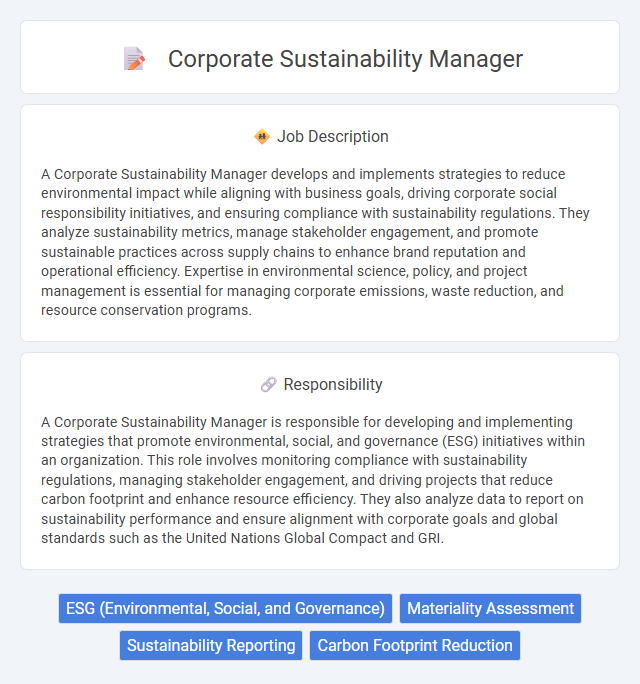
A Corporate Sustainability Manager develops and implements strategies to reduce environmental impact while aligning with business goals, driving corporate social responsibility initiatives, and ensuring compliance with sustainability regulations. They analyze sustainability metrics, manage stakeholder engagement, and promote sustainable practices across supply chains to enhance brand reputation and operational efficiency. Expertise in environmental science, policy, and project management is essential for managing corporate emissions, waste reduction, and resource conservation programs.
Individuals with a strong commitment to environmental and social responsibility are likely to thrive as Corporate Sustainability Managers. Those who possess excellent organizational skills, strategic thinking, and the ability to influence cross-functional teams may be well-suited for this role. Candidates who struggle with adapting to complex regulatory environments or lack passion for sustainable business practices might find this position challenging to fulfill effectively.
Qualification
A Corporate Sustainability Manager typically requires a bachelor's degree in environmental science, business administration, or a related field, with a preference for advanced degrees such as an MBA or a master's in sustainability. Proven experience in sustainability program development, environmental compliance, and stakeholder engagement is essential, along with strong analytical skills and knowledge of ESG (Environmental, Social, and Governance) frameworks. Proficiency in data analysis tools, sustainability reporting standards like GRI or SASB, and excellent communication skills are crucial for driving corporate sustainability initiatives.
Responsibility
A Corporate Sustainability Manager is responsible for developing and implementing strategies that promote environmental, social, and governance (ESG) initiatives within an organization. This role involves monitoring compliance with sustainability regulations, managing stakeholder engagement, and driving projects that reduce carbon footprint and enhance resource efficiency. They also analyze data to report on sustainability performance and ensure alignment with corporate goals and global standards such as the United Nations Global Compact and GRI.
Benefit
Corporate Sustainability Manager roles likely bring significant benefits such as improving a company's environmental and social impact, which can enhance brand reputation and stakeholder trust. There is a strong probability that their efforts contribute to cost savings through resource efficiency and waste reduction. Companies may also experience increased regulatory compliance and access to new markets by prioritizing sustainability initiatives.
Challenge
The role of a Corporate Sustainability Manager likely involves navigating complex regulatory environments and meeting stringent environmental standards, which can pose significant challenges. Managing stakeholder expectations while driving sustainable initiatives may require balancing short-term costs against long-term benefits. It is probable that the position demands strong problem-solving skills to integrate sustainability into core business strategies effectively.
Career Advancement
A Corporate Sustainability Manager plays a critical role in driving environmental, social, and governance (ESG) initiatives across organizations, positioning themselves for leadership roles such as Director of Sustainability or Chief Sustainability Officer. Mastery of sustainability reporting standards, stakeholder engagement, and regulatory compliance enhances career advancement opportunities in diverse sectors including manufacturing, finance, and technology. Increasing demand for expertise in climate risk assessment and sustainable supply chain management further accelerates professional growth and influence within corporate structures.
Key Terms
ESG (Environmental, Social, and Governance)
Corporate Sustainability Managers specialize in developing and implementing ESG strategies that enhance a company's environmental performance, social responsibility, and governance practices. They analyze sustainability metrics, manage regulatory compliance, and drive initiatives that reduce carbon footprint while promoting ethical labor standards and transparent corporate governance. Expertise in ESG frameworks like GRI, SASB, and TCFD is crucial for aligning business goals with sustainable development and attracting responsible investment.
Materiality Assessment
A Corporate Sustainability Manager specializing in Materiality Assessment evaluates environmental, social, and governance (ESG) factors to identify key issues impacting a company's long-term success and stakeholder value. They analyze industry trends, stakeholder expectations, and regulatory requirements to prioritize sustainability initiatives aligned with corporate strategy. Expertise in data collection, stakeholder engagement, and reporting frameworks such as GRI and SASB ensures transparent and actionable sustainability insights.
Sustainability Reporting
A Corporate Sustainability Manager specializing in Sustainability Reporting drives transparent disclosure of environmental, social, and governance (ESG) performance metrics aligned with global standards such as GRI, SASB, and TCFD. They integrate data analytics and stakeholder engagement to produce comprehensive sustainability reports that enhance corporate accountability and support regulatory compliance. Expertise in sustainability frameworks and software platforms ensures accurate, actionable insights that inform strategic ESG initiatives and improve long-term business resilience.
Carbon Footprint Reduction
Corporate Sustainability Managers specialize in developing and implementing strategies to reduce an organization's carbon footprint by optimizing energy consumption and promoting renewable energy sources. They analyze greenhouse gas emissions data, set reduction targets aligned with global standards such as the Science Based Targets initiative (SBTi), and collaborate with cross-functional teams to enhance sustainability practices. Their expertise drives measurable improvements in environmental performance, ensuring compliance with regulations and contributing to long-term corporate social responsibility goals.
 kuljobs.com
kuljobs.com